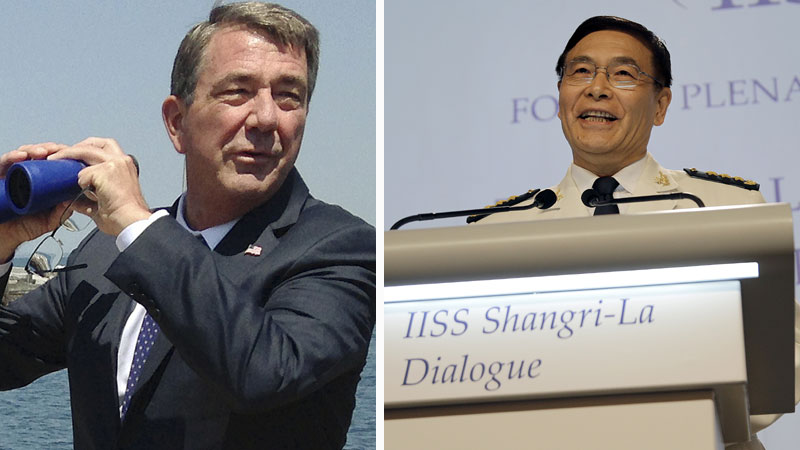
U.S. Defense Secretary Ashton Carter and China’s Deputy Chief, Joint Staff Department, Central Military Commission, Adm. Sun Jianguo AP
The Asia Security Summit—also known as the Shangri-La Dialogue, held over the weekend in Singapore—centered expectedly on the simmering maritime and territorial disputes in the South China Sea. It was the first time for the annual security forum to convene since China began significantly expanding its foothold on parts of the Spratlys by reclaiming land and establishing military bases; the discussions were intense and occasionally dramatic.
Beijing had learned how to make its case heard in the forum; instead of offering mere tough talk, this time it again sent a very senior military officer who did not only draw lines in the geopolitical sand but also displayed a gift for repartee.
On Friday, the first day of the forum, the American defense secretary, Ash Carter, aired a warning. “China’s actions in the South China Sea are isolating it at a time when the entire region is coming together and networking. Unfortunately, if these actions continue, China could end up erecting a Great Wall of self-isolation.”
When it was his turn on Sunday, Adm. Sun Jianguo, deputy chief of general staff of the People’s Liberation Army, responded to Carter in some style.
“We were not isolated in the past, we are not isolated now and we will not be isolated in the future. Actually I am worried that some people and countries are still looking at China with the Cold War mentality and prejudice. They may build a wall in their minds and end up isolating themselves.”
But the remark of Sun’s that captured international headlines was less philosophical in tone. “We do not make trouble, but we have no fear of trouble,” he had also said. “China will not bear the consequences, nor will it allow any infringement upon its sovereignty and security interests or stay indifferent to the irresponsible behavior of some countries in and around the South China Sea.”
It is true that, on the South China Sea issue, Beijing is not isolated internationally—but Chinese support comes from countries in Africa or Central Asia with which it has robust trade or provides aid to, none of which has any credibility to speak of the use of shipping routes or fishing grounds in the South China Sea. On the other hand, aside from rival claims of Vietnam, Malaysia, Brunei, Taiwan and the Philippines, regional powers have called China out for its aggressive expansionist policy. At the forum, the defense chiefs of the United States and India, together with Canada, Britain and France, all called on China to respect freedom of navigation in the area. The second stage of militarization of the outposts in the Spratlys and also the Paracel Islands is rightly seen as a threat to this freedom.
By “irresponsible behavior of some countries,” Admiral Sun was referring to the United States, which has dispatched warships to the area in so-called freedom of navigation operation (Fonop), and also to the Philippines, whose case before the arbitral tribunal in The Hague has deeply concerned the Chinese government.
“On one hand, they implement the so-called freedom of navigation program by openly showing military muscles in the South China Sea,” Sun said. “On the other hand, they support allies confronting China, forcing China to accept and honor the arbitration award. China firmly opposes such behavior.”
The most worrying aspect of Sun’s red line remarks is the development of the notion of “trouble.” Last October, for instance, in the aftermath of the first American Fonop, Beijing warned the United States to “not act blindly or make trouble out of nothing.” Sun’s repeated use of the idea on Sunday—“We do not make trouble, but we have no fear of trouble”—can be understood as a ratcheting of the language of resolve.
Before, the smaller countries in the region were concerned with Beijing’s redefinition of making trouble; it was always some other country’s action, and never China’s. Beijing, for instance, could claim that its new military bases were not expressions of an aggressive policy, and yet it accuses Manila of bullying conduct merely because it filed a lawsuit. Sun’s remarks, however, shift the focus of concern to Beijing’s readiness to meet counter-responses from claimant countries or their allies: “We have no fear of trouble.”
That is exactly what peace-loving, law-abiding countries are afraid of.

